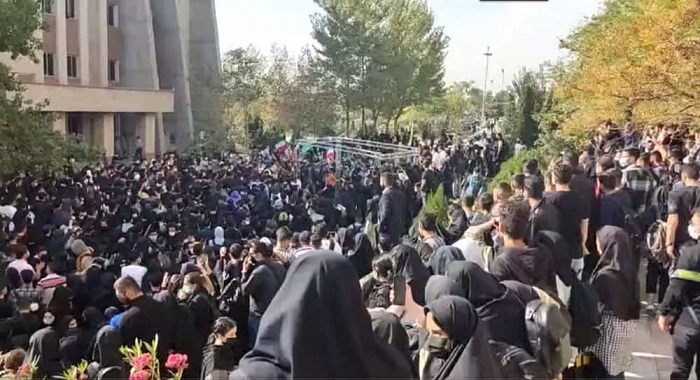
In a surprising move this July, Tehran University, one of Iran’s foremost institutions, opened its gates to members of Iraq’s Popular Mobilization Forces (PMF), also known as Hashd-al-Shaabi, a notorious militia group implicated in numerous crimes across Iraq and the Middle East.
The PMF, widely considered a proxy for Iran’s regime, has been controversially permitted to integrate into the Iranian academic sphere. The move, publicly backed by Mostafa Rostami, Iran’s Supreme Leader representative at universities, and Mohammad Moghimi, the president of Tehran University, has raised eyebrows and sparked debate. The acceptance of PMF members into the university, alongside students from countries aligning with the Resistance Axis, indicates a strategic decision from the regime.
Historically, Iranian universities were considered “Bastions of Freedom”. Ever since Tehran University’s inception in 1934 until the 1979 anti-monarchy revolution, the academic sphere played a vital role in promoting revolutionary ideas and facilitating opposition movements. Iranian students have historically been pivotal in various socio-political crises, showing their influence during earthquakes, protests against the Shah’s dictatorship, and in the face of suppression under the Khomeini regime.
Following the Cultural Revolution initiated by Supreme Leader Khomeini in 1980, the Iranian academic environment changed dramatically. Universities were closed until 1983 under the pretext of combating Westernism and Islamizing institutions. After reopening, the regime attempted to ensure control by allowing clerics and religious apprentices to infiltrate academia, establishing campus surveillance, and creating student Basij militias.
Teachers and students are on strike in various cities in #Iran. They have risen up against oppression by chants of “death to the dictator.” The force of solidarity among students, teachers and professors is expanding the uprising to overthrow the criminal mullahs. #IranProtests pic.twitter.com/89XsTEdnKZ
— Maryam Rajavi (@Maryam_Rajavi) October 4, 2022
The Basij, a volunteer-based Iranian paramilitary organization, has been given special privileges, including quotas in university entrance exams, which have been openly advertised on platforms such as daneshpezho.ir. The Iranian regime is offering opportunities for higher education and potential government positions to those who choose to align with it.
The precedent for providing educational scholarships to foreign military personnel dates back to 1997, when the “Palestine and University Council” was established. This move aligns with the recent decision to allow PMF forces into Iranian universities.
Despite the regime’s attempts to suppress political activism, several anti-regime protests have occurred, including notable uprisings in 1999, 2017, and 2022. The most recent protests, led by students, have been persistent in condemning all forms of dictatorship, countering the regime’s narrative, and highlighting the demise of the regime’s reform project.
In conclusion, the regime’s decision to invite the PMF into Tehran University reflects a continued effort to control the historically influential student population and to curb intellectualism. However, successive generations of Iranians have proven resilient against such attempts. The true impact of this recent development will be revealed in the face of the next uprising.
MEK Iran (follow us on Twitter and Facebook), Maryam Rajavi’s on her site, Twitter & Facebook, NCRI (Twitter & Facebook), and People’s Mojahedin Organization of Iran – MEK IRAN – YouTu

